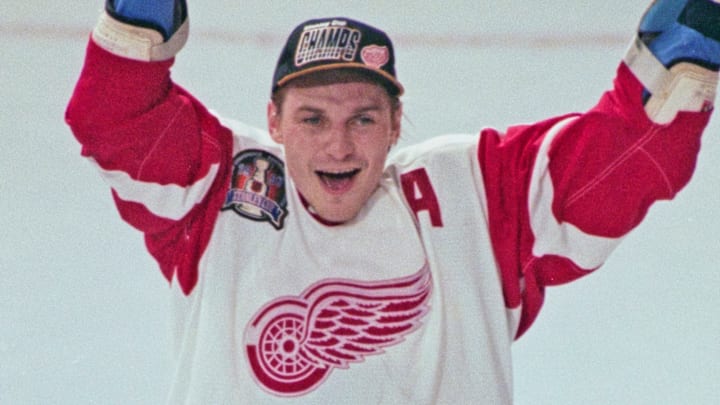For Sergei Fedorov, this moment may well transcend even the triumphs of his Stanley Cup victories.
On January 12, 2026 — amid the centennial celebrations of the Detroit Red Wings — the franchise will retire Fedorov’s iconic No. 91. A three-time Stanley Cup champion, Fedorov receives not just a ceremonial honor, but something more personal: a sense of reconciliation.
Long overshadowed by the complexities and controversies surrounding his departure from Detroit, this recognition serves as a powerful gesture of redemption — and perhaps, long-awaited closure.
Why Sergei Fedorov left Detroit
In 2003, Fedorov approached unrestricted free agency for the first time in his career. The Red Wings, eager to retain their star, extended a multi-year offer that would have made him the highest-paid player in the NHL at the time.
After requesting time to consider the offer, Fedorov saw the Red Wings’ ownership withdraw the proposal—an abrupt turn that ultimately led him to sign with the then-Anaheim Mighty Ducks, the very team that had ousted Detroit from the playoffs just months earlier.
To many fans, the move felt like a betrayal. When Fedorov returned to Joe Louis Arena, he was greeted not with gratitude, but with resounding and relentless boos. Reflecting on the decision years later,
Fedorov admitted in January that, given the chance to do it over, he would have signed with Detroit without hesitation.
“Sign everything that Detroit offered and continue working calmly,” Fedorov explained to Russian website Sport-Express as to what his choice should have been. “Don’t escalate the situation.”
It wasn't the first time Fedorov was involved in such controversy. He was one of the key contributors in Detroit's 1997 Stanley Cup victory, which was the franchise's first title in close to half a century. But his relationship with the team took a nosedive in the coming months that followed after he held out of training camp and the first several months of the regular season as part of a contract dispute.
Fedorov had previously signed a lucrative offer sheet with the Carolina Hurricanes, which the Red Wings ultimately matched—an extraordinary financial commitment that saw him earn $28 million in 1998 alone.
That figure included a $2 million base salary, a $14 million signing bonus, and an additional $12 million bonus triggered by Detroit’s advancement to the Western Conference Final, a milestone they reached en route to their second consecutive Stanley Cup title.
By the time 2003 arrived, the organization showed little appetite to revisit that level of negotiation. There was a lingering sense within the front office that, despite his brilliance on the ice, Fedorov remained as emotionally mercurial as he had been five years earlier.
Fedorov doesn't regret departure
When asked the same question in recent days, Fedorov reflected on the emotions he felt at the time and stood by his decision to join Anaheim. While he harbors no regret over the move, he emphasized that, in his heart, he has always been—unequivocally—a Red Wing for life.
“That’s a good question,” Fedorov said after a pause. “You know, in the few seconds while you asked it, I realized—I don’t regret it. I remember exactly how I felt back then. Of course, there’s a part of my reasoning that I’ve only ever shared with those closest to me. But I can honestly say it was the right decision. It was a deeply human, sincere choice. At that time, it was how I truly felt.
“In our world, humanity has always come first. I can’t say we ever had a bad relationship. Every decision—mine or the Red Wings’—was made by professionals. Everyone understood what was happening behind the scenes."
Fedorov was always one of us
With the past in the rearview, Fedorov is open to being involved with the organization on a long-term basis even beyond the alumni credit, which is still an incredible feat in of itself.
"That’s a fair thought. If Detroit’s management wants me involved professionally, I’d be happy to do it. I’d gladly share my experience, mentor young players, and help raise the next generation of Red Wings champions.
“I don’t know all the details [on the ceremony] yet. What I do know is that I’ll have around 50 close friends and family with me. They’ll be coming from all over the world, not just Russia. As for the rest—that’s up to the organizers.”Fortunately, the passage of time has helped heal the rift—not only between Fedorov and the Red Wings organization, but also with the fanbase that once viewed his departure with bitterness.
On January 12, Fedorov’s iconic No. 91 will ascend to the rafters of Little Caesars Arena, where it will remain for generations to come. That evening, multiple eras of hockey fans will converge—those who witnessed his brilliance unfold on the ice, and those who have come to know his legacy through stories, grainy footage, and highlight reels. It will serve as a powerful reminder that true greatness not only endures, but transcends eras.
More from Octopus Thrower
